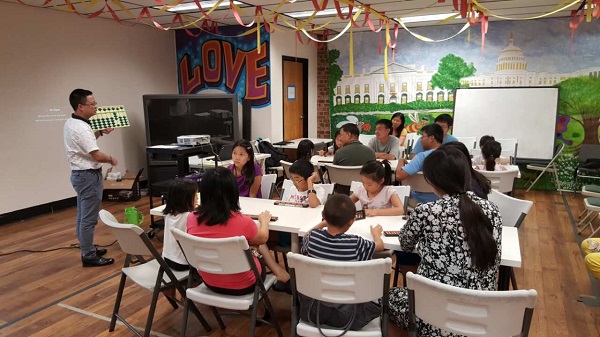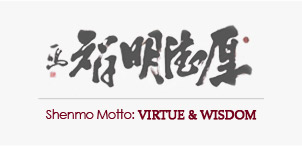SHENMO MOTTO: Virtue & Wisdom
-
“Licensing effect”—invisible stumbling block
2015-07-08 丨
The writer is from the Ministry of culture development

Licensing effect is a psychological effect, which roughly means that: “When we do something that we think is good, we will feel good, and then we will indulge ourselves in doing some other things contrary to it; because we may deservedly think that the indulgence is the best reward for doing “good” things and we forget the reasons for doing “good” things, succumbing to the temptation”.
“I have been so good and I deserve a small reward”. Such kind of desire for compensation often makes us degenerate.
It seems incredible, but in fact it often happens. There is an example in the book The Willpower Instinct of Harvard University, that is, after sweating profusely by doing exercise in the gym, a lot of people will immediately go out to eat and drink too much or have night snack with friends, so their weight keeps going up. It is obviously that they want to lose weight, but why don’t they control the diet? Because for them, to do exercise in the gym is a “good thing” rather than a necessary thing, they cannot remember the purpose of fitness as long as going out of the gym, and they will think that they just finished a good thing, so they shall reward themselves, thus forgetting to control themselves.
This phenomenon is universal:
Ayelet Fishbach, a professor of Graduate School, Booth School of Business, University of Chicago, and Ravi Dhar, a professor of School of Management, Yale University, have proved that the progress made by making great efforts in a process will stimulate people to make an act contrary to the goal. In an experiment, they told some dieters how much weight they had lost, and then they provided an apple and a bar of chocolate for these dieters as a gift to celebrate this success, but the dieters can choose only one between them. 85% of these dieters chose chocolate as a gift. While for those dieters who have not been told that they’ve lost a certain weight, only 58% of them chose chocolate.
In fact, it has the same situation in our daily teaching. For example, if we spend a lot of time learning a particular skill and feel that we’ve learned it very well, then we may get slack at it for a few days. Similarly, when going out for study or conference, many people would spend half a night with classmates, they may drink, have a dinner party, amuse themselves, or hang out—the acquisition of a little knowledge may lead us to give up striving and if we think back about our own learning or work experience, we can find that this strange logic always exists: I listened to the teacher carefully in the whole morning and took a dozen pages of notes, and I felt good about myself, so I wanted to reward myself and I decided to have a relax, while the results was that I spent the whole afternoon relaxing and totally forgot the purpose is to study. This little indulgence is actually the influence of “licensing effect”.
More interestingly, even if to imagine the efforts to be made or make an endeavor plan, it may trigger the “licensing effect”. Think back to the time in school, what did you do when determining to study hard every time; think about the work, what did you do when listing promotion plan every time; even when determining to be a great socialism successor after reading chicken soup for the soul, what did you actually do?
More seriously, in daily life, things related to morality and value can lead to riskier “moral licensing effect”, which may explain why those who have obvious moral standards are more likely to excuse their unethical behavior and believe that their serious moral problems are reasonable—such as doctors, lawyers, et al.—there are the fiscal conservative who used public funds to repair his/her own house, the police who is violent with the powerless perpetrators; for the same reason, educators and people running schools who shoulder the social mission may also fall into the trap of the interests above everything. Most people will not question their impulsion when thinking that they have high moral character. And some people’s work always makes them believe that they have high moral character.
All things moralized or evaluated subjectively by us are inevitably affected by the “licensing effect”. If you think you are “good” by doing some exercise and are “bad” by not doing exercise, then tomorrow you probably will not do exercise because today you did. If you think you are “good” by dealing with an important project and are “bad” by delaying dealing with it, then you are likely to be lazy in the afternoon because you made progress in the morning. In short, as long as there are positive thing and negative thing in our thinking, the good behavior always allows us to do something bad.
Therefore, when doing a thing, remove the moral and subjective evaluation and just simply do it in order to make the brain domain responsible for evaluation have a rest; always remember the reasons for and purposes of doing a thing and remind yourself to avoid thinking about the reward of indulgence when feeling good; most of all, prove and change yourself with practical action rather than firmly believe that you are the expected yourself based on your own wishful thinking.
The very beginning mind itself is the most accomplished mind of true enlightenment is the classical wisdom of Guoxue, the general meaning of which is to remember the original intention of doing things rather than always evaluate whether you are doing it well or right.
“I have been so good and I deserve a small reward”. Such kind of desire for compensation often makes us degenerate.
It seems incredible, but in fact it often happens. There is an example in the book The Willpower Instinct of Harvard University, that is, after sweating profusely by doing exercise in the gym, a lot of people will immediately go out to eat and drink too much or have night snack with friends, so their weight keeps going up. It is obviously that they want to lose weight, but why don’t they control the diet? Because for them, to do exercise in the gym is a “good thing” rather than a necessary thing, they cannot remember the purpose of fitness as long as going out of the gym, and they will think that they just finished a good thing, so they shall reward themselves, thus forgetting to control themselves.
This phenomenon is universal:
Ayelet Fishbach, a professor of Graduate School, Booth School of Business, University of Chicago, and Ravi Dhar, a professor of School of Management, Yale University, have proved that the progress made by making great efforts in a process will stimulate people to make an act contrary to the goal. In an experiment, they told some dieters how much weight they had lost, and then they provided an apple and a bar of chocolate for these dieters as a gift to celebrate this success, but the dieters can choose only one between them. 85% of these dieters chose chocolate as a gift. While for those dieters who have not been told that they’ve lost a certain weight, only 58% of them chose chocolate.
In fact, it has the same situation in our daily teaching. For example, if we spend a lot of time learning a particular skill and feel that we’ve learned it very well, then we may get slack at it for a few days. Similarly, when going out for study or conference, many people would spend half a night with classmates, they may drink, have a dinner party, amuse themselves, or hang out—the acquisition of a little knowledge may lead us to give up striving and if we think back about our own learning or work experience, we can find that this strange logic always exists: I listened to the teacher carefully in the whole morning and took a dozen pages of notes, and I felt good about myself, so I wanted to reward myself and I decided to have a relax, while the results was that I spent the whole afternoon relaxing and totally forgot the purpose is to study. This little indulgence is actually the influence of “licensing effect”.
More interestingly, even if to imagine the efforts to be made or make an endeavor plan, it may trigger the “licensing effect”. Think back to the time in school, what did you do when determining to study hard every time; think about the work, what did you do when listing promotion plan every time; even when determining to be a great socialism successor after reading chicken soup for the soul, what did you actually do?
More seriously, in daily life, things related to morality and value can lead to riskier “moral licensing effect”, which may explain why those who have obvious moral standards are more likely to excuse their unethical behavior and believe that their serious moral problems are reasonable—such as doctors, lawyers, et al.—there are the fiscal conservative who used public funds to repair his/her own house, the police who is violent with the powerless perpetrators; for the same reason, educators and people running schools who shoulder the social mission may also fall into the trap of the interests above everything. Most people will not question their impulsion when thinking that they have high moral character. And some people’s work always makes them believe that they have high moral character.
All things moralized or evaluated subjectively by us are inevitably affected by the “licensing effect”. If you think you are “good” by doing some exercise and are “bad” by not doing exercise, then tomorrow you probably will not do exercise because today you did. If you think you are “good” by dealing with an important project and are “bad” by delaying dealing with it, then you are likely to be lazy in the afternoon because you made progress in the morning. In short, as long as there are positive thing and negative thing in our thinking, the good behavior always allows us to do something bad.
Therefore, when doing a thing, remove the moral and subjective evaluation and just simply do it in order to make the brain domain responsible for evaluation have a rest; always remember the reasons for and purposes of doing a thing and remind yourself to avoid thinking about the reward of indulgence when feeling good; most of all, prove and change yourself with practical action rather than firmly believe that you are the expected yourself based on your own wishful thinking.
The very beginning mind itself is the most accomplished mind of true enlightenment is the classical wisdom of Guoxue, the general meaning of which is to remember the original intention of doing things rather than always evaluate whether you are doing it well or right.

-
NEXT:
Learning process needs to break throug... On Jun 10, 2015 >
LATEST

- First Online Shenmo Training for Ru On Mar 29, 2021

- Online Shenmo Entrepreneurship Exchange Meeting On Mar 29, 2021

- First Shenmo Online Abacus Mental M On Feb 03, 2021
EVENTS
Combination of Traditional Culture and Mo On Jun 02, 2020
Shenmo News:Shenmo Nigeria Abacus Mental On Oct 23, 2019
Shenmo News:The delegation of the 1st On Oct 21, 2019







